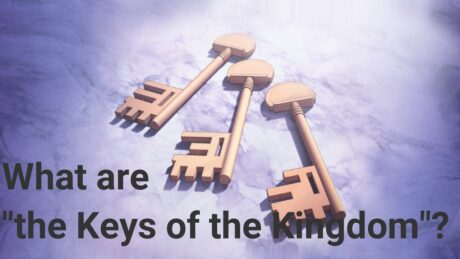Sharing is Caring!
The Kingdom of Kingdom – Bible
The debate between the Kingdom of God and the Kingdom of Heaven has been ongoing for ages. Some say both these kingdoms are different, whereas others say they’re one and the same.
The term ‘Kingdom of God’ can be seen up to 68 times in the New Testament. On the other hand, the Kingdom of Heaven appears thirty-two times and exclusively in the Book of Matthew.
The question here is, why was the term ‘Kingdom of Heaven’ used solely by Matthew? What connotations and implications does this have for Believers?
What is the need to understand the differences between these two? Let us dig deeper into the Scriptures to find out the differences and similarities between these two kingdoms and simultaneously answer the above questions.
What Is The Kingdom of Heaven?
The Kingdom of Heaven is a literal kingdom where God dwells. It is more of a physical kingdom. Many people think of it as the third heaven, which is the current dwelling place of the Lord.
God rules the universe from the Kingdom of Heaven. As Believers, we’re citizens of both the Kingdom of God and the Kingdom of Heaven.
I shall elucidate this in the upcoming passages.
In Psalm 103:19 the Bible mentions the Kingdom of Heaven. It says,
“The Lord has established his throne in heaven (Kingdom of Heaven), and his kingdom rules over all.”
Here, the Psalmist, David, compares the Throne of God with the Kingdom of God, thereby clarifying its physical nature.
Many others seem to ascribe to the spiritual nature of the Kingdom of Heaven, calling it one and the same as the Kingdom of God, but there seems to be quite a difference between the two.
Jesus talked about the Kingdom of Heaven in many of His sermons. Matthew talks about Christ proclaiming the coming of the Kingdom of Heaven (Matthew 10:7).
Christ also spoke about repentance relative to the coming of the Kingdom of Heaven.

Is There Any Difference Between The Kingdom of God And The Kingdom of Heaven?
There is absolutely a distinct difference between the Kingdom of God and the Kingdom of Heaven. But they cannot be separated from each other; they’re both connected.
Consider the example of a tree. It has roots, stems, and leaves; they’re all different parts of the tree and a whole singular unit.
One cannot function without the other, and they have different functions. In the same way, the Kingdom of Heaven is a part of the Kingdom of God.
Ultimately, both these Kingdoms belong to God, who is the Ruler of it all.
What is the Difference Between the Kingdom of God and the Kingdom of Heaven?
However, there is a basic difference between the Kingdom of God and the Kingdom of Heaven. The former is a spiritual Kingdom, whereas the latter is a physical one.
Although they’re different, they both are eternal kingdoms. They also differ with respect to nature and function.
The Kingdom of God is the eternal Kingdom of God. It has no beginning or end. It has existed since forever and will continue to exist because God has no beginning or end.
Differences Between The Kingdom of God And The Kingdom of Heaven
- Difference 1: As I stated above, the Kingdom of God is a spiritual Kingdom. However, the Kingdom of Heaven is a physical one.
- Difference 2: The Kingdom of God is where God rules over all things in the universe. This Kingdom includes the earth, the heavens, and the entire universe. As the Psalmist says in Psalm 24:1, “The earth is the Lord’s, and everything in it, the world, and all who live in it.” It is all a part of the Kingdom of God. He rules it all.
On the other hand, the Kingdom of Heaven is the dwelling place of God; it cannot be seen by the eyes of flesh. As we live in the flesh right now, we cannot see or reach out to the Kingdom of God.
- Difference 3: The Lord God created the world to possess a united spiritual and physical Kingdom. The narrative of Adam and Eve proves this very point. They communed with God every single day; God would come down to walk with them, talk, and commune with them. They were perfect and sinless, just like the Lord had intended them to be. They were in a perfect and harmonious relationship with God.
But with the fall, sin took over, and they were tainted. They were now separated from God, and the Kingdoms were divided. But the good news lies in the Gospel here.
The Gospel changed everything. Jesus Christ came to restore the order of things and to bring us back to God. Even though the kingdoms are still separate, now we can approach the throne of God at all times and have a fulfilling relationship with Him.
- Difference 4: Through the death and resurrection of Christ, God made way for us to enter the Kingdom of God. We’re already a part of the Kingdom of God due to our salvation. We’re now saints and no more sinners. When we reach the mortal end of our lives and die, we will ultimately go to the Kingdom of Heaven to dwell with our God. The Holy Spirit is the seal of the promise that every believer bears. He is a guarantee of the salvation of the saints and of the promises to come.
- Difference 5: The Kingdom of Heaven is the third heaven. There, Jesus Christ sits at the right hand of the Father. Every believer will go home to be with Christ, either through death or the rapture. When Jesus spoke of the Kingdom of heaven, He said that it was near and at hand (Matthew 4:17).
He also asked His disciples to spread the Gospel and preach the same to others. When Jesus comes back for His bride (the church), He will set up His Kingdom on this earth. He will rule from Jerusalem along with the church. All the saints will rule along with Him. His Kingdom will be one of peace and righteousness. The Kingdom of God and the Kingdom of Heaven will become one here; God will dwell with His children.
- Difference 6: Daniel speaks of Christ and His Kingdom in Daniel 7:13-14, “In my vision at night I looked, and there before me was one like a son of man, coming with the clouds of heaven. He approached the Ancient of Days and was led into his presence. He was given authority, glory, and sovereign power; all nations and peoples of every language worshiped him. His dominion is an everlasting dominion that will not pass away, and his Kingdom is one that will never be destroyed.”
Here, Daniel is talking about the Kingdom that Christ will establish on the earth in the coming days. This Kingdom has existed since time immemorial but will now come down to the earth where the bride of Christ will rule with Him for ages. A merger is what this speaks of.
Concerning the Kingdom of God, Luke 13:28-29 says, “There will be weeping there, and gnashing of teeth, when you see Abraham, Isaac and Jacob and all the prophets in the Kingdom of God, but you yourselves thrown out. People will come from east and west and north and south, and will take their places at the feast in the Kingdom of God.”
Those who are saved will enter the Kingdom of God, which is heaven. But those who don’t call upon the name of Christ and do not receive His salvation will be thrown into the fires of hell.
They are neither part of the Kingdom of God nor will they ever enter the Kingdom of Heaven.
Here, the author is referring to the millennium age, which will be a part of the Kingdom of God (the merging of the kingdoms).
- Difference 7: The Kingdom of Heaven is a part of our future. As believers, we will soon go there and live with our God forever and ever. In the meantime, we are a part of the Kingdom of God. He lives in us, and he calls us to live according to His will.
Why Is The Kingdom of Heaven Unique To Matthew?
Many theologians and some Believers declare that Matthew wrote his Gospel of Christ for a Jewish audience.
The Jews are quite strict when it comes to using the name of the Lord.
They do not want to use His name in a way that causes them to stumble or sin. So, they say, Matthew used the term the Kingdom of Heaven instead of the Kingdom of God to reach his audience effectively.
Matthew wanted to be effective with his audience, so he used the term Kingdom of Heaven more often. The Jews have been familiar with both the words, the Kingdom of God and the Kingdom of Heaven, since before Jesus even walked this earth in His fleshly life. But Matthew used the word ‘Heaven’ instead of ‘God’ so that he wouldn’t offend anyone and get his message through without any misunderstandings.
Who Could Enter The Kingdom of God?
The Kingdom of God is for all born-again Believers. Everyone who comes to Christ will enter the Kingdom of Heaven. The Kingdom of God already exists in our hearts because God rules over our hearts and lives.
In the future, when Christ comes for His Church, the Kingdom of God and the Kingdom of Heaven shall become one. Then, we will be a permanent part of the Kingdom of God and live with Christ forever and ever.
As Revelation 21:3 says, “And I heard a loud voice from the throne saying, “Behold, the dwelling place of God is with man. He will dwell with them, and they will be his people, and God himself will be with them as their God.” Christ is our eternity.
Conclusion
In conclusion, the Kingdom of Heaven and the Kingdom of God are different. I have explained the basic difference between the two Kingdoms.
I went deep into the topic and studied seven differences between these kingdoms.
Additionally, I’ve informed you that these kingdoms will merge when Christ comes back for His bride, the church. We’ve seen the implications and connotations these two Kingdoms have on believers.
We’ve also seen how a person can enter the Kingdom of Heaven. Have you received the salvation of Christ? Do you have the Kingdom of God in your life today?
Thanks to Markus Spiske for the photo above!


